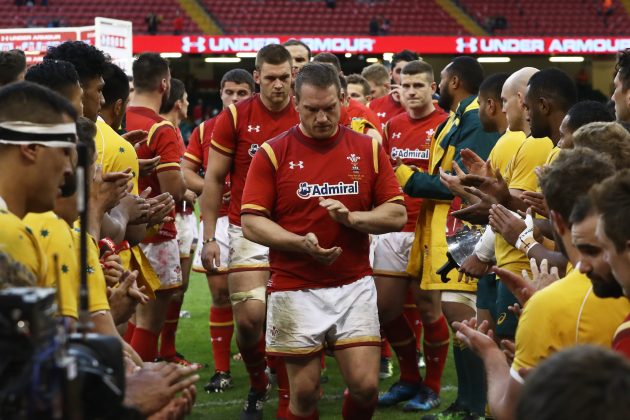In a desperately disappointing first Autumn outing, Wales were outthought, outfought and outplayed by the Wallabies. Expect the post-mortem to be long and arduous
The slowest of slow starts
Wales have become notoriously sluggish starters in the autumn internationals. However, Wales’ 32 – 8 loss to Australia was beyond sluggish. This was like watching a hungover sloth using a slow cooker. Wales were mastered by an Australian team which largely struggled during The Rugby Championship yet dominated Wales in every department. It took Wales until the 17th minute to register their first forward carry which is truly remarkable in a game in which the core principle is to carry the ball forward. Barring some solid work from Gethin Jenkins, the Wallaby back row owned the breakdown for 80 minutes.

Out of the blocks: Reece Hodge scores early on as Wales failed to get started
On second viewing, some of the Australian ruck ball was so fast that it looked as though my TV was replaying the game on +3. The speed of the Wallaby ball regularly caught Wales’ defensive line out of place and allowed their backline to pour through the Welsh defence. Some of the line breaks were so clean that many Welsh defenders didn’t even have the chance to attempt a tackle. During the first half Wales had just 20% of the territory and 30% of the ball which led to as unbalanced a first half of test rugby as you will ever see. It was a sorry day for all of the Welsh team with the exception of Ross Moriarty, he can hold his head up high – the others may be looking down for the majority of this week.
Dummy runners perplexed Wales
The word ‘dummy’ in rugby refers to the player who is made to look as though he is the intended recipient of a pass. On Saturday ‘Dummy’ was a more accurate reflection of the Welsh defenders as they turned 180 degrees to see another Wallaby pour through the middle. Admittedly, the last minute change of Scott Williams for Jon Davies will have affected the Welsh defence, but not to a huge degree – Williams is a very good test centre and a very solid defender.

Finding the gaps: The Wallaby strike runners perplexed the Welsh defence
The speed of the Wallaby’s ruck ball meant that a simple dummy, or screen, left even warrior-like defenders like Jamie Roberts baffled. Every Wallaby line break and try left the Welsh backline looking at each other with blank expressions as though they had been zapped by that memory loss gun from ‘Men in Black’. Except on this occasion it was men in gold who caused the blank expressions.
Wales missed Sam Warburton
I have a new smart phone which actually allows me to change the TV channel on any TV in my house. It’s amazing. But it’s not its primary function and it isn’t the reason that it was selected. And it’s the same for open-side flankers. Many forget that for outside backs or other back row forwards to make flashy 30 yards breaks in the wider channels somebody has had to take 30 shoulders to the face in order to win that ball in the first place.

The skipper: Sam Warburton was a miss for his breakdown work
Without Sam Warburton and Taulupe Faletau Wales were unable to secure little meaningful possession or, worse still, slow the Wallaby’s ball. Gethin Jenkins was effective as ever at the breakdown but you can’t expect a prop who will regularly be the last player to leave a scrum, lineout and maul to be the first or second player to get to the breakdown and especially not for 80 minutes. Wales need Faletau and more specifically Warburton back immediately.
No offload game
The majority of the Southern Hemisphere teams, especially the All Blacks, Argentina and the Wallabies, are playing a modern offload game based on skills – Wales are not. The Wallaby backline made twelve offloads, Wales half that. During the first half Israel Folau appeared to be playing a different sport such was his ability to step and offload. It’s a major problem for Wales. Currently the Welsh squad is set up for big direct carries, high balls between the 10 metre lines and goal kicking from any ensuing penalties.

Space to offload: Israel Folau was one of many Wallaby backs able to offload
As was apparent on Saturday, and has been for over 2 years, tries are now winning games, not goal kicks. Despite losing at the weekend to a tremendous performance from Ireland (in which they scored five tries), the All Blacks have slaughtered all before them with Beauden Barrett placing the kicking tee (and despite being a magnificent player, goal kicking is not exactly Barrett’s strength). To beat the top four sides in the world, Wales need to start scoring three to four tries a game. This simply isn’t happening.
Moriarty is here to stay
When the dark stares and even darker words are delivered in the Welsh camp this week, they will not be aimed at Ross Moriarty. He was, by some distance, Wales’ best performer. This will come as no surprise to any Gloucester supporters who will have seen the eight/ blindside deliver test performances for his club this season.

All action: Ross Moriarty was one of the few standouts for Wales
He was the pack’s leading ball carrier, with metres gained not merely number of carries, joint top in the entire squad for defenders beaten and the top tackler with 18. It was a determined performance amongst what was largely dreck. In a squad of test veterans it was the relative newcomer who didn’t panic in the face of overwhelming possession and territorial numbers. The status quo of the Welsh back row can no longer remain – even when all are fit, Moriarty must start.





